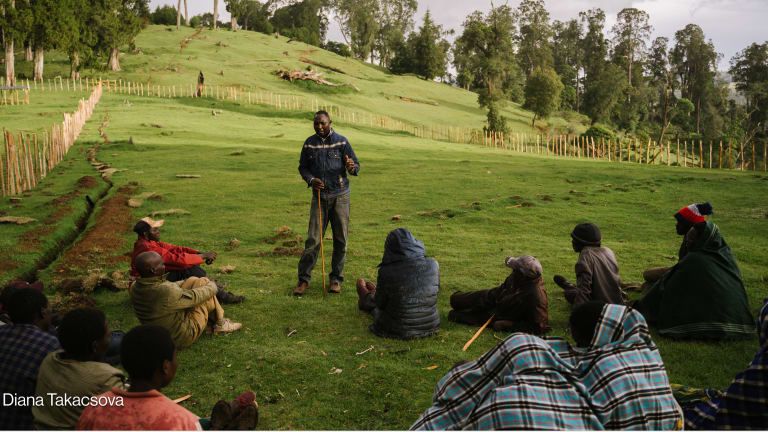As I sit on my doorstep and write this blog, I can see the Lundazi river, whose banks rise gently to reveal the charming grass triangles of a small mud hut village. In the distance, I can see the hills of Malawi, which tempt my mind to wander amongst their streams and valleys. The consistently azure blue sky completes this particularly serene, rural African image.
When we first arrived in Lundazi, a grass fence and thick hedge meant that we were not able to see such a beautiful view. But with a spate of theft and the constant requests from people asking for money, fruit from our trees, or jobs, or attention from children just wanting to comeand stare at the Muzungus (white people), we would happily trade our African vista for some privacy.
Unfortunately, privacy it is not that easy to restore. The hedge, maintained by the summer rains that ended in February, has become withered to become little more than a transparent boundary marker. It is therefore easily crossed by anyone interested in coming to our house, or making a shortcut between two roads. Furthermore, the grass fences - typically erected in villages, towns and cities across this part of Africa - were recently outlawed by my employers, the Lundazi District Council.
Citing the Public Health Act - one of the few pieces of legislation that empowers the council to make arbitrary bylaws - the Lundazi District Council argued that grass fences were responsible for attracting mosquitoes to the township. In other words, a town free of grass fences would also be free of malaria.
The bylaw was announced three weeks before it was deliberated by the relevant committee. The minutes of the meeting showed that a proposal to ban grass fences was approved, yet there was none of the necessary procedure to create such a bylaw. It was not proposed or seconded by any councilor, it was not voted on, and neither was it brought before the full council for ratification, as required by law. Nevertheless, three days later, the police started tearing down all the grass fences in the township.
Nine months later, Betty and I now have a beautiful view, but limited security and no privacy. We have installed round-the-clock security to stop the increasingly brazen attempts to steal the motorbikes, bicycles and gardening items that we keep at the back of the house. We have already lost two water buckets, a bicycle, a front wheel, a hosepipe, a motorbike battery and a bike pump. Then last week, a friend disturbed a man hacking away at the chain that keeps our motorbikes locked together. In the wake of the Lusaka incident a few weeks ago, Betty does not feel safe.
It is clear that most residents of Lundazi know where the white people live and also whether they are at home or not. Rural Zambia has a different understanding of private property to the one that Betty and I are used to, and privacy is something that does not seem to be valued. Despite having acres of available land in the township, new homes are springing up practically on top of each other. Fruit trees are seen as common property, meaning there is a constant stream of customers hacking away at our guava and lemon trees. These trees also serve as a useful excuse for any would-be thieves to get up close to the house.
We now have the feeling that we are being watched like fish in a goldfish bowl. We rarely sit outside because of the incessant chorus of children greeting us, "How are you?" The mindless staring of open-mouthed adults drives us to seek refuge inside, where we feel trapped.
When I explained this to a colleague, he suggested I build a wall fence. Wall fences need planning permission, thousands of bricks and dozens of packs of cement, as well as skilled plans to be drawn and semiskilled laborers employed to lay the bricks. A grass fence, made from long reeds grown in the villages and constructed by casual labor, will cost me approximately 1 percent of the cost of the wall fence - a fact that he seemed incapable of acknowledging.
Although expensive - about $2,000 - it is an option for Betty and me. For the majority of Lundazi, it is way beyond their financial means. It has also taken away the livelihood of those who used to grow and construct grass fences, and instead has provided business for those who bring in building materials from outside Lundazi. What is more, I don't think I have ever encountered such a universally unpopular decision, based on nonexistent "scientific" evidence, which has been so meekly accepted by the population.
Aid has often been accused of relying on independent decisions made by unelected individuals. Similarly, decentralization is seen as a way to avoid mistakes being made by officials in Lusaka, who cannot understand the impact the laws they are making are having on those that have to live with them. Decentralization - or shifting power from the central government to the local authority - is seen as the best way to overcome that. Zambia is currently undergoing such a process, which will see the council take the lead in all government business.
What this episode demonstrates is that decentralization, without empowering communities to understand and demand their rights, will fail to stop poor decisions from being made. What this will solely achieve is shifting power from out-of-touch decision-makers living in ivory towers to those that live behind wall fences.








